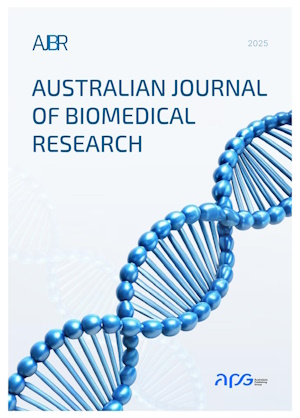
Aims and Scope
Aims
The Australian Journal of Biomedical Research (eISSN: 3083-4708) aims to advance the frontiers of biomedical science by publishing rigorous, innovative, and impactful research across a wide range of disciplines. As an open-access, peer-reviewed journal, AJBR provides a platform for researchers, clinicians, and interdisciplinary scientists to contribute to the understanding, diagnosis, treatment, and prevention of diseases that affect human health.
Scope
The journal invites original research, reviews, and case reports in the following areas:
1. Molecular and Cellular Biology
AJBR welcomes original research and reviews that explore the molecular mechanisms underlying cellular processes. Topics of interest include:
- Cell signaling pathways
- Gene expression and regulation
- Protein-protein and protein-DNA interactions
- Cell cycle, apoptosis, and autophagy
- Mechanisms of disease at the molecular and cellular levels
- Advanced microscopy and imaging techniques
We prioritize work that enhances the understanding of cellular responses in health and disease and provides molecular insights into therapeutic targets.
2. Clinical and Translational Research
AJBR serves as a bridge between bench and bedside. This section emphasizes:
- Clinical trials (phases I–IV)
- Translational studies moving lab discoveries into clinical applications
- Biomarker discovery and validation
- Personalized medicine and pharmacogenomics
- Real-world data and health outcomes research
- Innovative diagnostic tools and clinical decision support systems
Manuscripts should demonstrate strong clinical relevance and methodological rigor.
3. Pharmacology and Toxicology
This section covers experimental and theoretical work in:
- Pharmacodynamics and pharmacokinetics
- Drug design, development, and delivery
- Natural products and medicinal chemistry
- Preclinical toxicology and safety pharmacology
- Adverse drug reactions and drug-drug interactions
- Mechanistic toxicology and environmental health
Submissions that reveal novel mechanisms of drug action or toxicity and support drug development are especially encouraged.
4. Biomedical Engineering
We welcome interdisciplinary studies that integrate engineering principles with biomedical applications, including:
- Development of medical devices and implants
- Biosensors and diagnostic tools
- Bioinstrumentation and imaging technologies
- Tissue engineering and 3D bioprinting
- Bioinformatics and computational modeling
- Artificial intelligence and machine learning in biomedical applications
Papers should clearly demonstrate biomedical relevance and innovation in design or application.
5. Genomics and Proteomics
This section features high-throughput and systems-level studies, such as:
- Whole-genome and transcriptome sequencing
- Functional genomics and epigenetics
- Proteomic profiling and protein biomarker discovery
- Multi-omics integration and analysis
- Bioinformatics pipelines and data interpretation
- Population genomics and genetic epidemiology
We encourage studies that offer insights into disease mechanisms or contribute to personalized healthcare.
6. Infectious and Non-Communicable Diseases
AJBR supports the global effort to combat both communicable and non-communicable diseases by publishing:
- Pathogen biology and host-pathogen interactions
- Epidemiological and surveillance studies
- Chronic diseases: cardiovascular, metabolic, respiratory, renal, neurological, and cancer
- Public health interventions and disease prevention strategies
- Antimicrobial resistance and novel therapeutics
- Impact of climate change and social determinants on disease burden
Both mechanistic and applied studies with strong public health relevance are welcome.
7. Regenerative Medicine and Stem Cell Research
We aim to highlight research that explores cellular therapies and regenerative approaches, including:
- Stem cell biology and differentiation
- Induced pluripotent stem cells (iPSCs)
- Tissue regeneration and organoids
- Clinical trials in regenerative therapies
- Ethical and regulatory aspects
- Scaffold materials and bioengineering applications
Studies should provide significant biological insights or demonstrate translational potential.
General Expectations
All submitted manuscripts should:
- Present original and significant findings
- Follow rigorous scientific and ethical standards
- Be clearly written and logically structured
- Include implications for biomedical research, clinical practice, or public health
AJBR encourages interdisciplinary and collaborative research that pushes boundaries and contributes to the advancement of global health.